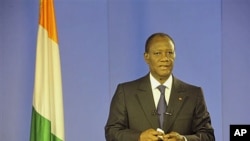Ivory Coast's new government is calling for a truth and reconciliation commission to help address human rights abuses, including those committed during the political crisis that followed November's presidential election. Many challenges face a commission meant to reunite a country divided by more than 10 years of civil war, instability, and political violence.
President Alassane Ouattara says a truth and reconciliation commission will help Ivorians move beyond the suspicion that has dominated much of the last decade.
President Ouattara says reconciliation cannot be achieved without justice, and reconciliation cannot be effective without forgiveness. So following last week's arrest of former president Laurent Gbagbo, Mr. Ouattara says he telephoned South African President Jacob Zuma to say that he will need South Africa's experience and support to have an effective truth and reconciliation commission.
What to do about Laurent Gbagbo?
Deciding what to do about Mr. Gbagbo is the highest-profile challenge. He refused to recognize that he lost last year's election to Mr. Ouattara and held on to power for months with the help of the army.
Kenyan Prime Minister Raila Odinga was the African Union mediator between the rival presidents. He says Mr. Gbagbo should be pardoned.
"The civil war will not end that is why we are talking about reconciliation," he said. "If we want to reconcile, give Gbagbo a safe exit. Then get some of his people because he represents a number of people and also a big region in the country. Get those people in the government so you play a game of inclusivity."
Human Rights Watch says Mr. Gbagbo should not be allowed exile in a country that would shield him from prosecution as that would only heighten tension inside Ivory Coast.
"President Ouattara is inheriting a country that is deeply divided along ethnic, religious and regional lines," said Corinne Dufka, who heads the West Africa office for Human Rights Watch. She says the neutrality of the commission will depend on it having a broad political balance.
"The type of mandate and the composition of the commission and all of those issues will then set the state for how legitimate, how meaningful this commission will be to address these very deep divisions and make recommendations against their occurrence," she said.
President Ouattara says the commission will help Ivorians come to terms with a sometimes painful past.
The president says Ivorians must know what happened, who did what, and for what reasons as far back as 1999. He says people must admit their crimes and beg the nation for forgiveness. President Ouattara says impunity will come to an end in Ivory Coast because everyone is equal before the law, whatever their political affiliation, origin, religion, or ethnicity.
That promised autonomy is especially important as Dufka says some of Mr. Ouattara's own fighters are guilty of human rights abuses.
"For the first several months following the elections, the most serious violations were committed by Gbagbo's troops against real and perceived supporters of Ouattara," said Dufka. "Once the armed conflict had reignited, then forces loyal to Ouattara committed extremely serious violations. And not just in the west of the country but also in Abidjan."
Commission cannot replace justice
While the truth and reconciliation commission will play an important role in the new Ivory Coast, Dufka says it can not replace justice.
"It should not be seen as a substitute for some sort of accountability process," she said. "Because this now tragically-established cycle of violence and impunity that has existed in Cote d'Ivoire for over 10 years will not be stopped until those responsible for the very serious violations over the last decade have been held accountable."
The end of the political crisis between Mr. Ouattara and Mr. Gbagbo is an opportunity but by no means a guarantee for a more peaceful future.
Father Daniel Meledje is a priest in Abidjan's Saint Etienne parish. During these difficult times, Meledje says, people are seeking a peace that comes from God because that peace touches everyone's heart. Ivorians are seeking peace so they can live in happiness. Without peace, he says, people cannot reconcile their differences.












